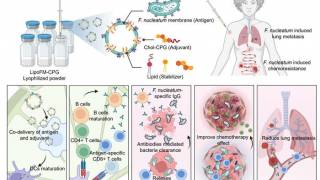Melanoma Vaccine Granted Fast-Track Designation

A California based immuno-oncology announced that the U.S. Food and Drug Administration (FDA) has granted its application for Fast Track designation of seviprotimut-L, its melanoma cancer vaccine for the adjuvant treatment of stage IIB/IIC melanoma patients post-resection to improve recurrence-free survival.
The final analysis of clinical data from Part B1 of Melanoma Antigen Vaccine Immunotherapy Phase 3 Study of seviprotimut-L was presented at the American Society of Clinical Oncology Virtual Scientific Program, held online May 29-31, 2020.
"The Fast Track designation by the FDA provides further validation of seviprotimut-L as a potentially new and important cancer vaccine for patients with localized melanoma," said Alan Yu, Chairman of Polynoma and Vice President & Chief Operating Officer at CK Life Sciences, in a press release issued on June 23, 2020.
Fast Track is designed to facilitate the development and expedite the review of drugs that treat serious or life-threatening conditions and fill an unmet medical need.
The interval between progression from Stage II to Stage III/IV melanoma marks a critical therapeutic intervention point to improve survival.
Treatment of Stage IIB/IIC melanoma is primarily limited to surgery, coupled with a "wait and see" approach.
However, recurrence of the disease can occur following definitive resection of the melanoma.
Many patients progress to more advanced stages following resection and five-year survival rates fall sharply after a patient passes from localized Stage II melanoma into regional Stage III disease (98.4% to 63.6%).
And, 5-year survival rates are distinctly lower (22.5%) for metastatic Stage IV.
Seviprotimut-L is an allogeneic, polyvalent, partially purified shed melanoma antigen vaccine derived from 3 proprietary human melanoma cell lines.
Seviprotimut-L stimulates humoral and cellular immune responses.
Melanoma-associated antigens (MAAs) found in seviprotimut-L are taken up by antigen-presenting cells (e.g., dendritic cells) which then activate the production of antigen-specific cytotoxic T-lymphocytes (CTLs) as well as develop antibody responses against MAAs.
These CTLs and antibodies then recognize and act on tumor cells expressing the MAAs on their surfaces, causing cell death.
Seviprotimut-L is currently in development for the adjuvant treatment of patients with Stages IIB to IIIC melanoma, following definitive resection.
Skin cancer is one of the most commonly diagnosed cancers in the U.S and around the world. Of those skin cancers, melanoma is the most serious and deadly form.
In 2020, an estimated 100,350 new cases of melanoma will be diagnosed in the U.S. alone, and an estimated 6,850 people in the U.S. will die from the disease.
Globally, there are approximately 350,000 cases of melanoma and nearly 60,000 deaths a year.
While it still represents less than 5% of all cutaneous malignancies, melanoma accounts for the majority of skin cancer deaths.
Most early skin cancers are diagnosed and treated by removal and microscopic examination of the cells.
For melanoma, the primary growth and surrounding normal tissue are removed, and sometimes a sentinel lymph node is biopsied to determine the stage.
Melanomas with deep invasion or that have spread to lymph nodes may be treated with surgery, immunotherapy, chemotherapy, and/or radiation therapy.
Polynoma LLC is a U.S. immuno-oncology focused biopharmaceutical company headquartered in San Diego, California.
Cancer vaccine news published by Vax-Before-Cancer.
Our Trust Standards: Medical Advisory Committee

























